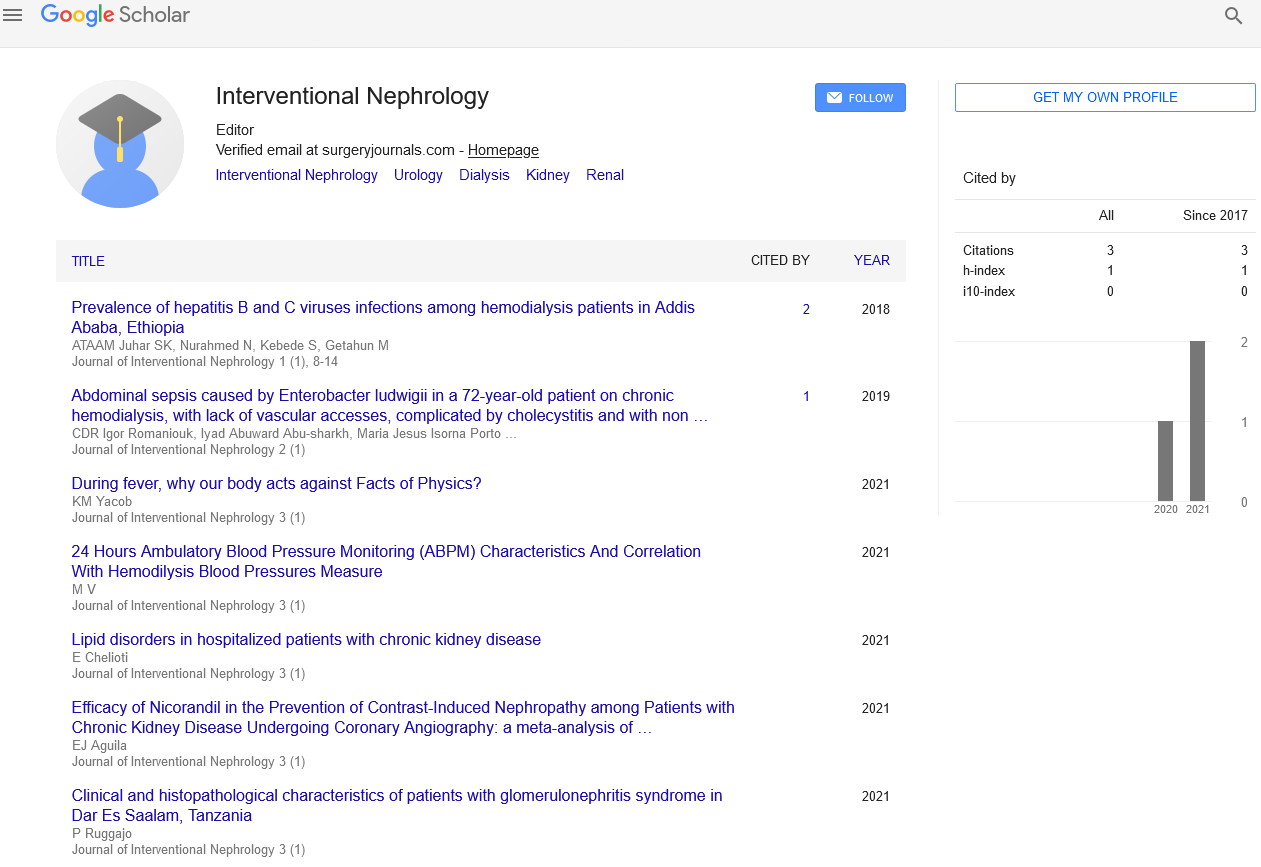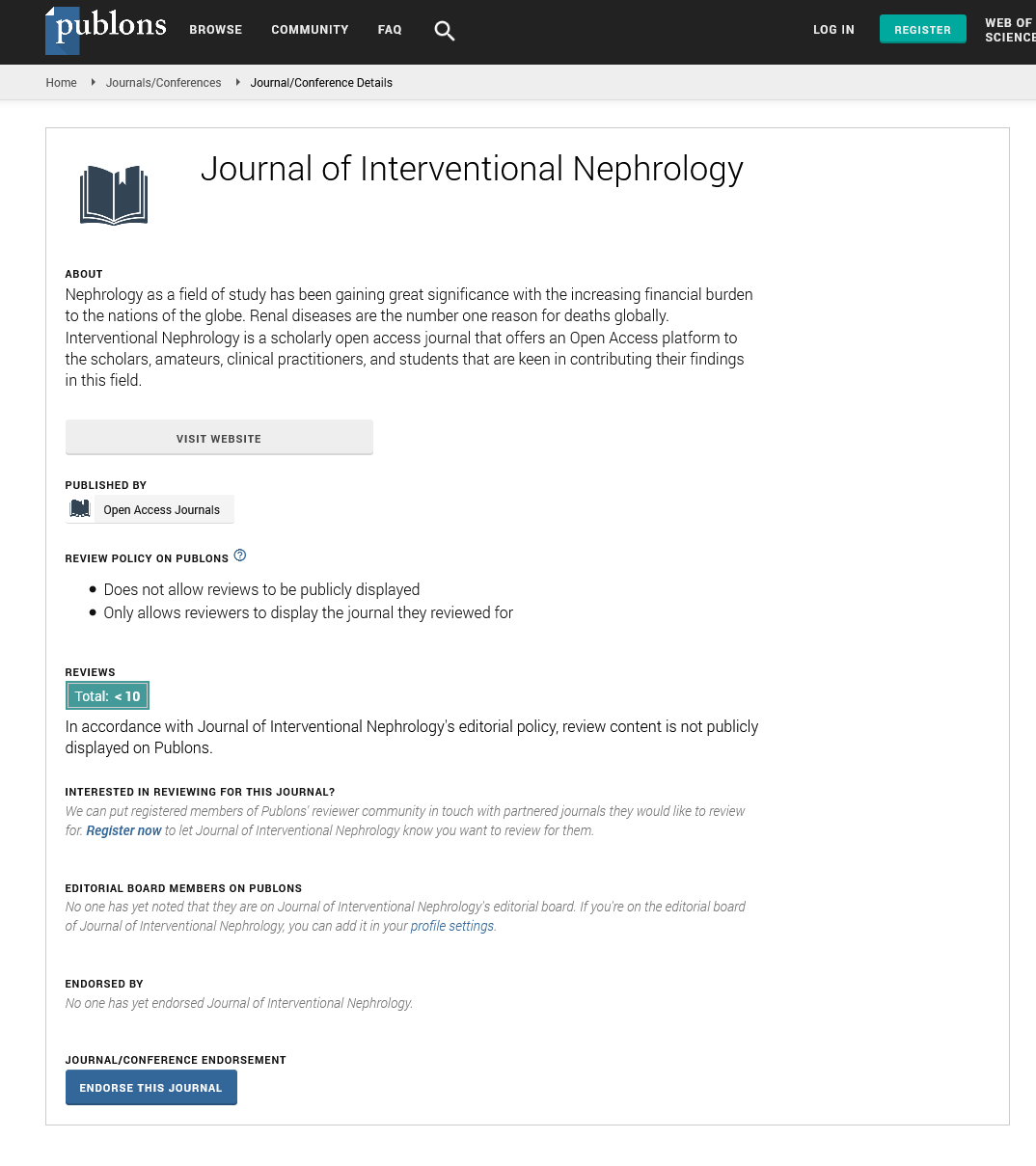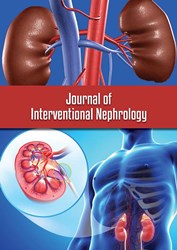Editorial - Journal of Interventional Nephrology (2023) Volume 6, Issue 3
Onconephrology: Intersecting Pathways of Oncology and Nephrology for Comprehensive Cancer Care and Renal Health Optimization
Ming Zerr*
University of Bhutan, Department of nephrology Science , College of Computer Science
University of Bhutan, Department of nephrology Science , College of Computer Science
E-mail: mingz@gmail.co.in.edu
Received: 02-06-2023, Manuscript No. oain-23-101615; Editor assigned: 05-06-2023, Pre QC No. oain-23- 101615; Reviewed:19-06-2023, QC No. oain-23-101615; Revised: 22-06- 2023, Manuscript No. oain-23-101615 (R); Published: 29-06-2023; DOI: 10.47532/oain.2023.6(3).73-75
Abstract
Onconephrology is an emerging medical subspecialty that focuses on the intricate relationship between cancer and kidney health. This field represents the intersection of oncology and nephrology, recognizing the coexistence of cancer and kidney disease and aiming to provide comprehensive care for cancer patients with renal complications. This article explores the epidemiology, pathophysiology, diagnostic challenges, and treatment strategies in onconephrology. The multidisciplinary approach required for optimal patient outcomes is emphasized, highlighting the collaboration between oncologists and nephrologists. By understanding the interplay between cancer and kidney function, onconephrology aims to optimize comprehensive cancer care while ensuring renal health preservation. The epidemiology of onconephrology reflects the diverse landscape of cancer types and the multifactorial nature of kidney-related disorders. Certain malignancies, such as renal cell carcinoma, multiple myeloma, and hematological cancers, exhibit a higher propensity for renal involvement. Additionally, several risk factors, including advanced age, pre-existing kidney disease, hypertension, diabetes, and specific genetic predispositions, contribute to the development of onconephrology conditions. Understanding the epidemiological factors associated with these conditions can aid in early identification, prevention, and tailored treatment strategies. The pathophysiology of onconephrology conditions encompasses a range of mechanisms that lead to kidney injury in cancer patients. Tumors may directly invade the kidneys, causing structural damage and functional impairment. Paraneoplastic syndromes can also affect renal function through immune-mediated processes or the release of soluble factors. Additionally, certain cancer treatments, such as nephrotoxic chemotherapeutic agents, can induce renal toxicity and exacerbate pre-existing kidney diseases. Comprehending these underlying mechanisms is crucial for accurate diagnosis and targeted therapeutic interventions.
Keywords
Onconephrology • Cancer • Kidney disease • Oncology • Nephrology • Comprehensive care • Renal complications • Epidemiology • Pathophysiology • Multidisciplinary approach
Introduction
The field of medicine continually evolves to address the complex interplay between different specialties and diseases. One such emerging subspecialty that has gained significant recognition is onconephrology, which focuses on the intricate relationship between cancer and kidney health. Onconephrology represents the intersection of oncology, the branch of medicine dedicated to the study and treatment of cancer, and nephrology, the discipline specializing in kidney disorders and renal function. By combining expertise from these two fields, onconephrologists strive to provide comprehensive care for cancer patients, addressing both their oncological needs and potential renal complications. Cancer and kidney disease frequently coexist, with the presence of cancer often leading to various renal conditions. These complications can arise due to direct tumor effects, paraneoplastic syndromes, or as a result of cancer treatments such as chemotherapy, radiation therapy, and immunotherapy. As a result, cancer patients may experience a wide range of kidney-related issues, including acute kidney injury (AKI), electrolyte imbalances, glomerulonephritis, and nephrotic syndrome, among others. Recognizing and effectively managing these renal complications is essential for optimizing patient outcomes and quality of life. The epidemiology of onconephrology reflects the diverse landscape of cancer types and the multifactorial nature of kidneyrelated disorders. Certain malignancies, such as renal cell carcinoma, multiple myeloma, and hematological cancers, exhibit a higher propensity for renal involvement. Additionally, several risk factors, including advanced age, preexisting kidney disease, hypertension, diabetes, and specific genetic predispositions, contribute to the development of onconephrology conditions. Understanding the epidemiological factors associated with these conditions can aid in early identification, prevention, and tailored treatment strategies. The pathophysiology of onconephrology conditions encompasses a range of mechanisms that lead to kidney injury in cancer patients. Tumors may directly invade the kidneys, causing structural damage and functional impairment. Paraneoplastic syndromes can also affect renal function through immunemediated processes or the release of soluble factors. Additionally, certain cancer treatments, such as nephrotoxic chemotherapeutic agents, can induce renal toxicity and exacerbate preexisting kidney diseases. Comprehending these underlying mechanisms is crucial for accurate diagnosis and targeted therapeutic interventions. Diagnosing onconephrology conditions can be challenging due to overlapping clinical presentations and the need for specialized investigations. Collaboration between oncologists and nephrologists is essential to navigate these diagnostic hurdles successfully. Close monitoring of renal function through laboratory tests, urine analysis, imaging studies, and, when necessary, renal biopsies, facilitates accurate diagnosis and guides appropriate treatment decisions[1-5]. A multidisciplinary approach is vital for comprehensive patient management, enabling the integration of oncological and nephrological expertise. Effectively managing onconephrology conditions requires a multifaceted approach that encompasses both cancer treatment and renal health optimization. Oncologists and nephrologists work together to strike a delicate balance between effectively managing cancer and preserving renal function. This may involve optimizing fluid and electrolyte balance, judicious use of medications to mitigate renal toxicity, adjusting chemotherapy protocols to minimize kidney injury, and implementing renal replacement therapies when necessary. By implementing a coordinated treatment plan, patients can receive holistic care that addresses both their cancer and renal needs.
Materials and methods
A thorough search of electronic databases, such as PubMed, MEDLINE, and Google Scholar, was conducted to identify relevant articles, research papers, reviews, and clinical guidelines related to onconephrology, cancer, and kidney disease. The search terms used included “onconephrology,” “cancer and kidney disease,” “renal complications in cancer,” “cancer treatment and renal function,” and similar variations. The articles obtained from the literature search were screened based on their relevance to the topic and their publication in reputable journals. Preference was given to recent publications, although seminal studies and landmark papers were also considered. The selection process aimed to include a diverse range of sources, including clinical studies, epidemiological data, pathophysiological explanations, diagnostic challenges, and treatment strategies. Pertinent information and key findings from the selected articles were extracted and organized into relevant sections of the article. The data extraction process focused on identifying key concepts, trends, and advancements in onconephrology. Emphasis was placed on summarizing the epidemiology of onconephrology conditions, understanding the pathophysiological mechanisms involved, highlighting diagnostic challenges, and outlining effective treatment strategies. The extracted data was analyzed, and the findings were integrated into a cohesive narrative that provides a comprehensive overview of onconephrology. The synthesis of information involved identifying common themes, patterns, and gaps in knowledge within the field. Where appropriate, specific examples and case studies were included to illustrate key concepts and clinical scenarios[6-10].
Conclusion
Onconephrology represents an important and evolving field that addresses the complex interplay between cancer and kidney disease. By integrating the expertise of oncology and nephrology, onconephrologists strive to provide comprehensive care for cancer patients, ensuring both optimal cancer treatment outcomes and preservation of renal health. The epidemiology of onconephrology reflects the diverse landscape of cancer types and the multifactorial nature of kidney-related complications. Certain malignancies, such as renal cell carcinoma, multiple myeloma, and hematological cancers, are more prone to renal involvement. Various risk factors, including advanced age, preexisting kidney disease, and specific genetic predispositions, further contribute to the development of onconephrology conditions. Understanding the pathophysiology of onconephrology conditions is crucial for accurate diagnosis and effective management. Tumors may directly invade the kidneys, leading to structural damage and functional impairment. Paraneoplastic syndromes and cancer treatments, such as chemotherapy and radiation therapy, can also cause renal complications. By unraveling these underlying mechanisms, onconephrologists can tailor treatment strategies and minimize renal injury while ensuring effective cancer management. The management of onconephrology conditions requires a multidisciplinary approach involving oncologists, nephrologists, radiologists, pathologists, and other healthcare professionals. Treatment strategies focus on striking a delicate balance between effectively managing cancer and preserving renal function. Optimization of fluid and electrolyte balance, judicious use of nephrotoxic medications, dose adjustments in chemotherapy protocols, and the implementation of renal replacement therapies when necessary are vital components of onconephrology management.
References
- AlSawaftah N, Pitt WG, Husseini GA et al. Dual-Targeting and Stimuli-Triggered Liposomal Drug Delivery in Cancer Treatment. ACS Pharmacol Transl Sci. 4,1028-1049 (2021).
- Brunelli D, Polonelli T, Benini L. Ultra-low energy pest detection for smart agriculture. IEEE Sens J. 1-4 (2020).
- Harrison, Paul. How shall I say it? Relating the nonrelational .Environ Plan A. 39, 590-608 (2007).
- Kamilaris A, Prenafeata-Boldú F. Deep learning in agriculture: A survey.Comput Electron Agric.147, 70-90 (2018).
- Imrie, Rob. Industrial change and local economic fragmentation: The case of Stoke-on-Trent. Geoforum. 22, 433-453 (1991).
- Acharya UR, Faust O, Sree V et al. Linear and nonlinear analysis of normal and CAD-affected heart rate signals. Comput Methods Programs Bio. 113, 55–68 (2014).
- Lvovs D, Favorova OO, Favorov AV et al. A Polygenic Approach to the Study of Polygenic Diseases. Acta Naturae. 4, 59-71 (2012).
- Meng Y, Bai H, Wang S et al. Efficacy of low carbohydrate diet for type 2 diabetes mellitus management: A systematic review and meta-analysis of randomized controlled trials. J Diabetes Res. 131, 124-131 (2017).
- Kohli HS, Bhat A, Aravindan P et al. Spectrum of renal failure in elderly patients. Int Urol Nephrol. 38, 759-765 (2006).
- Rashid G, Benchetrit S, Fishman D et al. Effect of advanced glycation end-products on gene expression and synthesis of TNF and endothelial nitric oxide synthase by endothelial cells. Kidney Int. 66, 1099-1106 (2004).
Indexed at, Google Scholar, Crossref
Indexed at, Google Scholar, Crossref
Indexed at, Google Scholar, Crossref
Indexed at, Google Scholar, Crossref
Indexed at, Google Scholar Crossref
Indexed at, Google Scholar, Crossref
Google Scholar, Crossref, Indexed at


